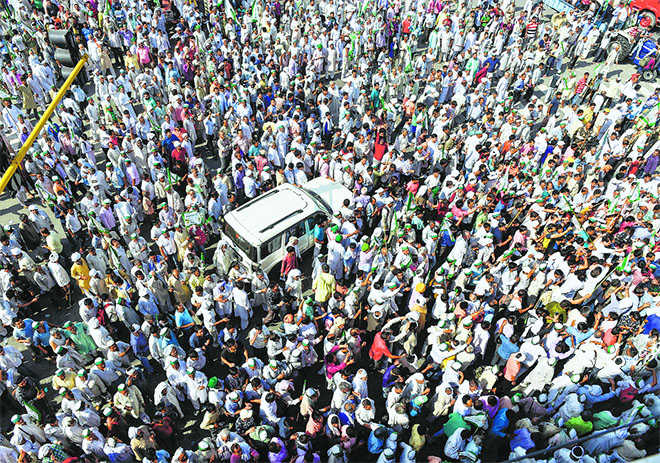
Farmer unrest: The government is clueless about what is plaguing farm economy.
Subir Roy
Columnist and author
WITH barely six months to go for the general election, it is important to take a view of the economic issues likely to impact people’s choices. Ordinary people have better things to do than worry about numbers like the growth rate and fiscal deficit. What they do care about is whether there is a feel good factor and if sharp price rises are putting necessities beyond their reach.
The clear plus for the present dispensation is that inflation is currently not a matter of general concern. But things can change rather quickly. If petrol and diesel prices (particularly the latter) keep going up as they have been over the recent past, it can lead to a rise in bus fares and truck rates whose consequences can disturb the public mood.
To counter this, the government has a key weapon in its hands. It has built up a fiscal cushion in the already high fuel prices so that it can absorb a fair amount of further increase in international prices in the next few months by lowering tax rates. This will not be good for fiscal deficit, which will put off analysts and economic commentators who account for no more than a few thousand votes! Setback on this front will translate into economic ill health and high inflation but the polling day will have come and gone by then.
The picture changes, however, when we look at the issue of feel good factor. It is intriguing that despite a high growth rate and India being headed for the status of becoming one of the largest economies in the world, the factor is non-existent.
One reason is that arithmetically it is possible to have high growth and burgeoning wealth at the aggregate level but people in general, particularly among the working class and farmers, do not feel a part of that wealth. This is if growing income inequality goes hand in hand with growing aggregate wealth. The number of big cars and second cars in even very middle class neighbourhoods, not to speak of the rapidly increasing numbers taking overseas holidays, bears testimony to this.
The biggest damage to the feel good factor at the lower income levels has clearly been done by first demonetisation and thereafter the chaos initiated by GST (admittedly, a bitter pill which had to be swallowed, making the system feel miserable initially but laying the foundations of a far more beneficial system). The two have created enormous disruption at the bottom (unorganised and smaller) end of business and manufacturing. Those dependent on their livelihood on businesses that may not even be separately incorporated have had to live with wages delayed, jobs temporarily gone, and in many cases, migrant workers having to go back home for a time.
The impact of this has been well captured in the performance of leading microfinance institutions which normally have a very high recovery rate (98 per cent plus) for the small unsecured loans they give to the working poor. Post demonetisation, their recovery rate plummeted for successive quarters by around 10 percentage points, impacting both the bottomline and the resources to give fresh loans to good borrowers.
The distress caused by demonetisation and introduction of GST was temporary but the distress among farmers and those who depend on agricultural economy for their livelihood is continuing. The surest sign of this is the periodic large farmers’ protests that state capitals and Delhi continue to witness.
The reality is that the government is groping in the dark on what is plaguing the farm economy. A significant change has taken place recently in that farm productivity has gone up sharply, creating a problem of plenty which has depressed prices for agricultural produce. This has kept inflation under control but those depending for their livelihood on farm incomes buy only a part of their food from the market, if at all.
The solution obviously lies in having a procurement system for major crops which works and, perhaps even more important, a crop insurance system that delivers. Neither of these has done so. In desperation, various state governments have gone in for farm loan waiver despite earlier lack of faith in this policy tool. The consequence of the failure on the farm front is widespread doubt among experts over the government’s ability to double farm incomes in five years.
The result of all this is a distinct urban-rural divide in the Indian polity which was pointedly brought out by the results of the last Gujarat Assembly elections. It was the urban vote that carried the BJP through in the Prime Minister’s home state.
This brings us to the other unkept promise of the Prime Minister — to deliver vikas (development) and crores of new jobs. For the purpose of our present discussion, the key issue is whether failure to deliver on this promise will cost the NDA significantly in the coming elections. As of now, there is no sign of this. The main Opposition party, the Congress, has been referring to the missing jobs only in passing, choosing to concentrate more on the allegation of corruption over the Rafale deal.
But there is a deeper underlying social issue. In 2014, many who did not traditionally vote for the BJP did so forgetting social divides and giving the party a chance to deliver on vikas. This has not happened. There is a good chance that in 2019 these voters will go back to voting along traditional social divides. There has also been a rise in social tension, with a sense of estrangement among Dalits and sections of backwards, not to speak of the minorities. Missing jobs can eventually impact votes as a social, not economic, issue.



























